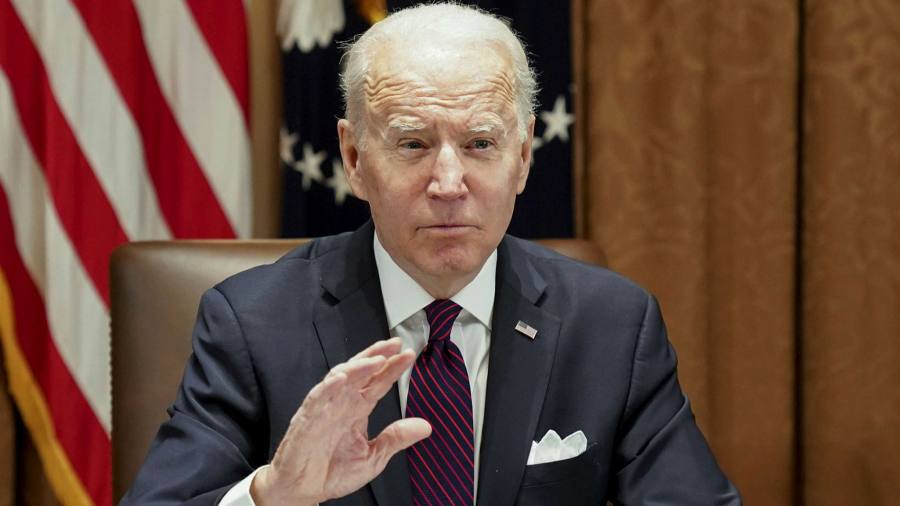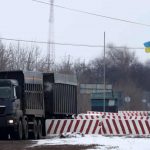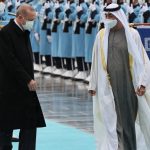From the first declassified, grainy spy photos of Russian tanks assembled on the Ukrainian border in November to president Joe Biden’s airing last week of his personal guess that Putin will “move in” and invade, the US and its western partners have for months fought a remarkably public war of words against the Kremlin’s perceived menace.
A daily bombardment of briefings, intelligence, threats and allegations from the White House, Nato, the EU and European capitals has marked a novel approach to avoiding war. The disclosure of information normally reserved for hidden negotiations is highly unusual in modern-day diplomacy.
But while the strategy has shifted the initial calculus for Russia and negated Moscow’s ability to surprise, it has come at the cost of broadcasting to a global audience the west’s divisions on how to handle Russia.
“Aggressors usually like to have a pretext for war, and the Americans going public have made that more difficult,” said Radoslaw Sikorski, who was Polish foreign minister during Russia’s war with Georgia in 2008 and invasion of Crimea in 2014.
“[But] it has made it more difficult for us too because it exposed for all to see how disjointed the west is . . . exposing an impression of western disarray, which goes back years,” added Sikorski, who is now a member of the European Parliament.
The US initially deployed public diplomacy to convince some wavering European countries that Russian president Vladimir Putin was considering an attack on his south-western neighbour.
Europe then adopted the same strategy, leaving no doubt in Moscow of the costs of military action: from painful sanctions on its economy to a better-armed Ukrainian army lying in wait, equipped with western defensive weapons that arrived with fanfare and press releases.
“In the beginning of this crisis, the US and the west more generally was losing the information war,” said Michael McFaul, former US ambassador to Moscow. He said the decision to declassify intelligence, highlight Russian proxy actions inside Ukraine and maintain a public dialogue with European partners was “to win back the narrative and reunify the West.”

“Of course, it all may not stop Putin from invading again, but with weak cards in their hands, Biden and his diplomatic team are playing them effectively,” he added.
At times, the constant publicity has appeared clumsy. The US insistence that a Russian attack is coming has bemused many in Kyiv, with officials insisting they see no major cause for alarm. Espionage findings that might have otherwise been quietly acted upon have been rushed out for public consumption: Britain’s warning this weekend that a coup was being planned in Kyiv — without publishing any evidence — has been met with widespread confusion.
And such a public approach has come at the cost of both laying bare differences in opinion between western allies that otherwise could have been masked by private dialogue, and shrinking the space for back-channel negotiations that could offer a breakthrough.
“Staying quiet might be perceived as acceptance in Moscow, so there is a need to keep reminding Russia that there is a united front and there will be a sharp response,” said Andrew Lohsen, a fellow at the Center for Strategic and International Studies think-tank. “The problem is that the longer this goes on, the more of a chance there is for fumbles and mistakes.”

Last week brought prominent fumbles.
First, French president Emmanuel Macron blindsided European and US allies with a call on Wednesday for a new, European-led negotiation track with Moscow, forcing his administration to clarify that it would complement, not compete, with the continuing peace talks led by the US.
Hours later, Biden admitted to the disagreements between western countries over how to respond to Russia, telling a primetime press conference that if Putin decides on a “minor incursion . . . then we end up having a fight about what to do and not do, et cetera.”

Then on Saturday the head of the German Navy on a visit to India told a televised meeting that the west should accept Crimea as Russian and “give Putin respect”. Vice admiral Kay-Achim Schönbach resigned the next day.
“Everyone has a different theory . . . I think [Putin] is trying to make a mess and put Europe on the back foot to see if there is some falling out among Europeans,” said a senior EU defence official. “[The EU] is very united. But the longer it lasts, the greater the possibility of splits.”
Some analysts have also questioned whether conducting high-stakes dialogue in press conferences and speeches has impeded efforts to find a negotiated solution. Publicised meetings earlier this month between Russia and the US, Nato and OSCE members descended into opportunities for both sides to restate their stringent — and incompatible — talking points.

“It will not be helpful for any real effort to find a solution, or to make progress, if I went into all the details [of possible areas for compromise] in an interview with the Financial Times,” Nato secretary-general Jens Stoltenberg told the FT before those meetings. “Serious diplomatic efforts require that we don’t conduct them publicly.”
And shining a light on the crisis may also have another unintended consequence of forcing Putin to take action to avoid appearing to have backed down under US pressure.
“This is fantastic for the Russians. They are back on the centre stage, in the spotlight,” said a senior EU security official. “But it all depends on how Putin can sell it at home.”
The number of Russian troops deployed close to the border is still increasing, despite Russian government officials insisting that there is no plan to attack. And after a meeting between the US and Russia in Geneva on Friday achieved the minor breakthrough of agreeing to stay in touch, the talking continues too.
“It’s a very tense, very fluid situation that changes every day, every hour, so we shouldn’t pay attention to specific moments, specific declarations. the philosophy is consistent, the goals are consistent,” José Manuel Albares, Spain’s foreign minister, told the FT.
“We need more co-ordination, it is not negative or positive,” he added. “It’s a simple need to adapt a dialogue that goes back to 1945 to the realities of 2022.”
Additional reporting by Aime Williams in Washington, Dan Dombey in Madrid and Victor Mallet in Paris
Source: FT



